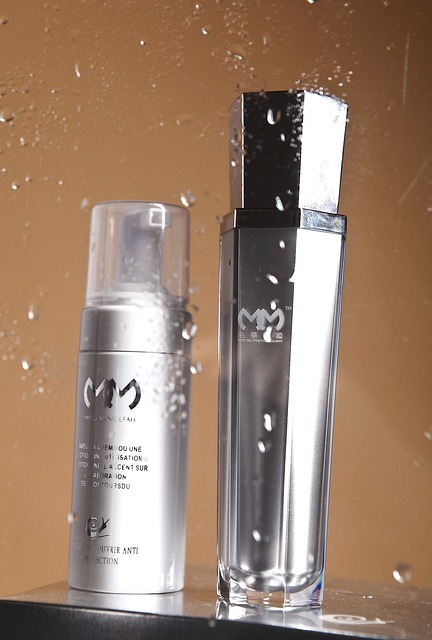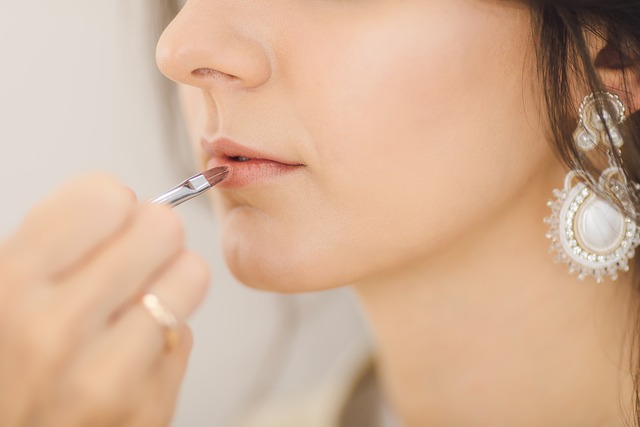Skin Smoothness and Radiance: Tailored Beauty Solutions for Every Type
This section provides a comprehensive guide on effective skincare for achieving a healthy, smooth, a…….

This section provides a comprehensive guide on effective skincare for achieving a healthy, smooth, and radiant complexion. It emphasizes the importance of understanding your skin type—normal, dry, oily, combination, sensitive, or acne-prone—to select appropriate products. Key ingredients like hyaluronic acid for hydration, vitamin C as an antioxidant, retinoids for cell turnover and anti-aging benefits, and exfoliating acids such as AHAs and BHAs for texture refinement are crucial for maintaining skin health. Personalized skincare regimens should balance moisture, address specific concerns, and protect against environmental stressors. For mature skin, a focus on hydration, collagen stimulation with retinol, peptides, and antioxidants is recommended to enhance resilience and combat aging signs. Dry and sensitive skin types require gentle, hydrating products that maintain the skin's barrier function, while all skin types can benefit from regular exfoliation to remove dead cells and reveal brighter skin. Incorporating a consistent routine of cleansing, moisturizing, and sun protection, along with a healthy lifestyle, is key to achieving and maintaining radiant, youthful-looking skin.
Exploring the intersection of skincare science and personalized beauty routines, our article delves into the efficacy of beauty products in enhancing skin smoothness and radiance. We will dissect the key ingredients that contribute to these qualities, providing guidance tailored to each skin type. From the anti-aging prowess of certain formulations for mature complexions to the hydrating effects ideal for dry and sensitive skin, this piece offers a comprehensive look at the best practices for exfoliation and texture refinement suitable for all skin types. Join us as we unravel the mystery behind beauty products’ claims and help you navigate your way to luminous, healthy skin.
- Ingredients that Promote Smoothness and Radiance
- Tailoring Beauty Regimens to Skin Types: An Overview
- Anti-Aging Products for Mature Skin
- Hydrating Solutions for Dry and Sensitive Complexions
- Exfoliation and Texture Refinement Strategies for All Skin Types
Ingredients that Promote Smoothness and Radiance

When seeking products that promote skin smoothness and radiance, understanding the key ingredients is crucial. Hydrators such as hyaluronic acid are renowned for their ability to retain moisture within the skin, plumping it up and creating a smoother texture. Vitamin C and its derivatives are potent antioxidants that not only brighten the complexion but also protect against environmental stressors that can lead to dull skin. They help in the synthesis of collagen, which contributes to the skin’s firmness and elasticity, further enhancing its radiance.
Retinoids, a form of vitamin A, are another essential component for maintaining skin vitality. They accelerate cell turnover, encouraging smoother skin by removing the topmost layer of dead cells. Additionally, retinoids stimulate collagen production, which is key to maintaining a youthful glow and improving skin texture. Exfoliating acids like AHAs (alpha-hydroxy acids) and BHAs (beta-hydroxy acids) are also beneficial for sloughing off dead skin cells, unclogging pores, and promoting a brighter, more even skin tone. Each skin type, from dry to oily, will respond differently to these ingredients; therefore, it’s important to select products formulated for your specific skin concern, ensuring optimal results and care for your unique skin needs.
Tailoring Beauty Regimens to Skin Types: An Overview

Crafting a beauty regimen that caters to one’s unique skin type is pivotal in achieving and maintaining smoother, healthier-looking skin. Each skin type—normal, dry, oily, combination, sensitive, or acne-prone—has distinct needs that must be addressed with tailored skincare solutions. For instance, normal skin typically requires a balance of hydration and mild exfoliation to maintain its radiance. Products rich in antioxidants can help protect against environmental stressors while ensuring the skin’s natural moisture levels are kept in equilibrium.
On the other hand, dry skin benefits from deeply moisturizing ingredients like hyaluronic acid and glycerin, which draw and lock in moisture. Gentle cleansers and serums that deliver a significant dose of hydration without causing irritation are essential. Oily skin, conversely, demands products with oil-regulating properties such as salicylic acid or clay-based masks to absorb excess sebum. Regular exfoliation can also help prevent the buildup of dead skin cells, which can clog pores and contribute to an oily complexion. Products for combination skin should focus on balancing both dry and oily areas, often requiring different treatments for different zones of the face. Those with sensitive skin should opt for fragrance-free, hypoallergenic formulas that are designed to soothe rather than irritate. Lastly, individuals with acne-prone skin should look for targeted treatments containing benzoyl peroxide or beta-hydroxy acids to address active breakouts and prevent future ones.
In all cases, the choice of skincare products should be informed by an understanding of one’s skin type and its specific needs. A consistent, well-rounded regimen that includes cleansing, moisturizing, and protection against harmful UV rays, when combined with a healthy lifestyle, can greatly enhance the skin’s appearance and overall health. It is through this personalized approach that one can truly unlock the skin’s potential for smoothness and luminosity.
Anti-Aging Products for Mature Skin

When addressing anti-aging concerns for mature skin, it’s imperative to select products formulated with ingredients known to target the visible signs of aging such as fine lines, wrinkles, and loss of elasticity. Hydration is a cornerstone in this regimen; moisture-rich formulas that maintain the skin’s lipid barrier are crucial for preserving its resilience. Look for products enriched with humectants like hyaluronic acid to draw and retain moisture within the skin, as well as emollients that help to soften and smooth the surface.
Retinol, a derivative of vitamin A, is often recommended by dermatologists due to its ability to stimulate collagen production, which can improve skin texture and firmness. Peptides are another key ingredient; they signal skin cells to produce more collagen and elastin, thereby enhancing skin’s structural support and reducing the appearance of aging. Additionally, antioxidants such as vitamin C and E can protect against free radical damage and brighten the skin tone. For mature skin, it’s beneficial to incorporate products that contain a synergistic blend of these active ingredients to address multiple aspects of aging for comprehensive results. Gentle exfoliation with alpha-hydroxy acids (AHAs) or beta-hydroxy acids (BHAs) can also aid in removing the topmost layer of dead skin cells, allowing newer, brighter skin to surface and reducing the appearance of age spots and hyperpigmentation. Always patch test new products to ensure compatibility with mature skin and consult with a skincare professional for personalized recommendations.
Hydrating Solutions for Dry and Sensitive Complexions

Individuals with dry and sensitive skin often grapple with a lack of moisture, which can lead to discomfort and a compromised barrier function. To address this, hydrating solutions tailored for these complexions are paramount. Products rich in humectants like hyaluronic acid and glycerin are highly effective at drawing and retaining moisture within the skin. These ingredients work by attracting water from the environment or deeper layers of the skin, ensuring that the stratum corneum remains plump and well-hydrated. Additionally, incorporating a gentle, fragrance-free cleansing routine is crucial to prevent stripping the skin of its natural oils, which can exacerbate dryness and irritation.
Following cleansing, applying a lightweight yet nourishing moisturizer formulated for sensitive skin can lock in hydration and protect against environmental aggressors. Look for ingredients such as ceramides, which help restore the skin’s natural lipid barrier, and niacinamide, an antioxidant that soothes inflammation and enhances skin’s texture and appearance without causing irritation. It is also advisable to use products with a mineral-based sun protection factor (SPF) to safeguard against UV damage, which can further dry out and age the skin. By selecting products carefully and establishing a consistent skincare routine, those with dry and sensitive skin can achieve a smoother, more radiant complexion while maintaining healthy, resilient skin.
Exfoliation and Texture Refinement Strategies for All Skin Types

Exfoliation is a cornerstone in any skincare regimen aimed at achieving smoother and more radiant skin. This process involves removing the outermost layer of dead skin cells to reveal the newer, fresher skin beneath. Different skin types require specific exfoliation methods to avoid irritation or ineffectiveness. For dry skin, gentle scrubs with hydrating ingredients can be beneficial; these should contain fine particles that are kind to the skin, such as oatmeal or sugar, and paired with moisturizing components like glycerin or shea butter. Oily skin, on the other hand, may benefit from chemical exfoliants like alpha hydroxy acids (AHAs) and beta hydroxy acids (BHAs), which can penetrate deeper into pores to remove excess oil and dead skin cells without over-drying the skin. Combination skin should use targeted exfoliation, focusing on areas that are prone to oiliness with BHA and on dry patches with AHA-based products. Sensitive skin must proceed with caution; enzymatic exfoliants like papaya or pineapple extracts can provide effective exfoliation without the potential irritation of physical scrubs.
Texture refinement strategies complement exfoliation by addressing skin texture and tone. Products containing retinoids, peptides, or antioxidants like vitamin C can enhance collagen production, which in turn improves skin elasticity and smoothness. These should be integrated into a skincare routine according to the individual’s tolerance and skin type. For instance, retinoids are often better tolerated by those with normal to oily skin, while drier skin types might benefit more from peptides or a gentler form of retinol. Additionally, incorporating serums with hyaluronic acid can plump the skin, filling in fine lines and enhancing overall texture. It’s crucial to introduce new products gradually and to use sunscreen during the day as these active ingredients can make the skin more sensitive to UV radiation. By combining effective exfoliation with texture refinement strategies tailored to each skin type, individuals can achieve smoother, healthier-looking skin and a more radiant complexion.
In conclusion, the relationship between beauty products and skin health is complex yet clear: the right ingredients and regimen can indeed contribute to smoother and radiant skin. It’s imperative to tailor skincare routines according to individual skin types for optimal results. Whether addressing the unique needs of aging skin or hydrating dry and sensitive complexions, a well-curated beauty regimen can make a significant difference. Exfoliation and texture refinement are beneficial practices for all, enhancing the skin’s natural glow without unnecessary abrasion. By incorporating products rich in promoting ingredients and understanding how they interact with your skin type, one can achieve the desired smoothness and radiance.
